Lesson 37 Let’s learn Geography 课件 (2)
文档属性
| 名称 | Lesson 37 Let’s learn Geography 课件 (2) |  | |
| 格式 | ppt | ||
| 文件大小 | 4.9MB | ||
| 资源类型 | 教案 | ||
| 版本资源 | 冀教版 | ||
| 科目 | 英语 | ||
| 更新时间 | 2017-03-24 18:21:17 | ||
图片预览


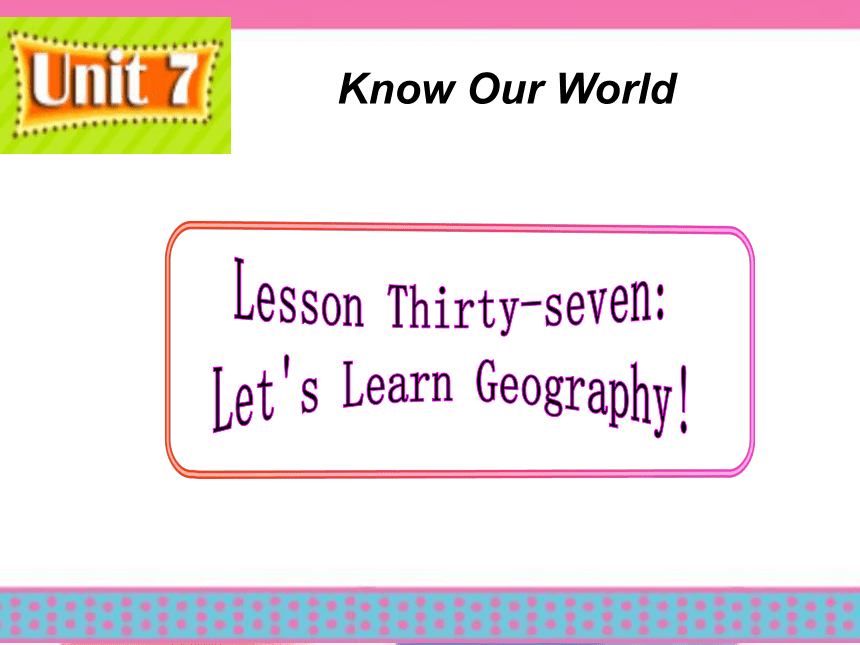

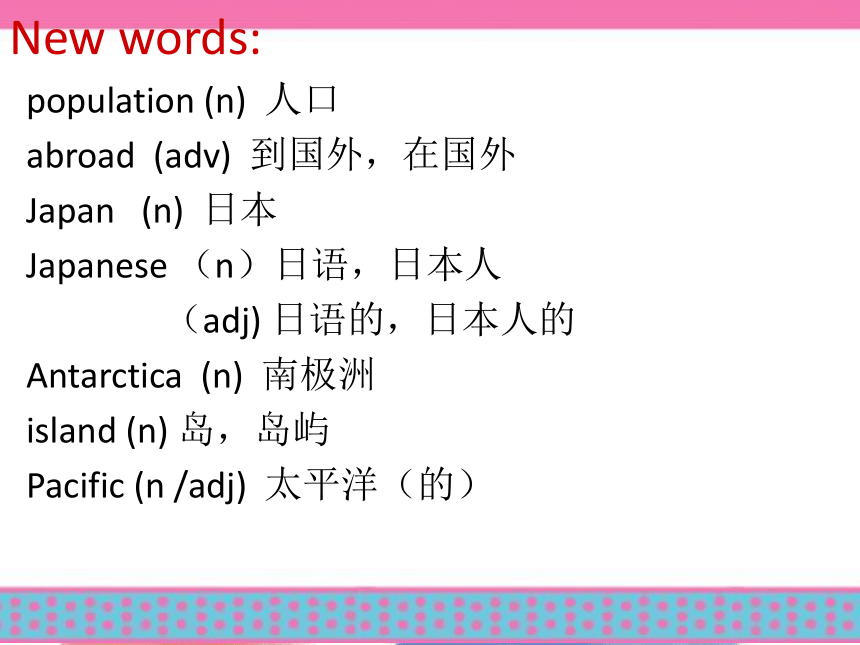
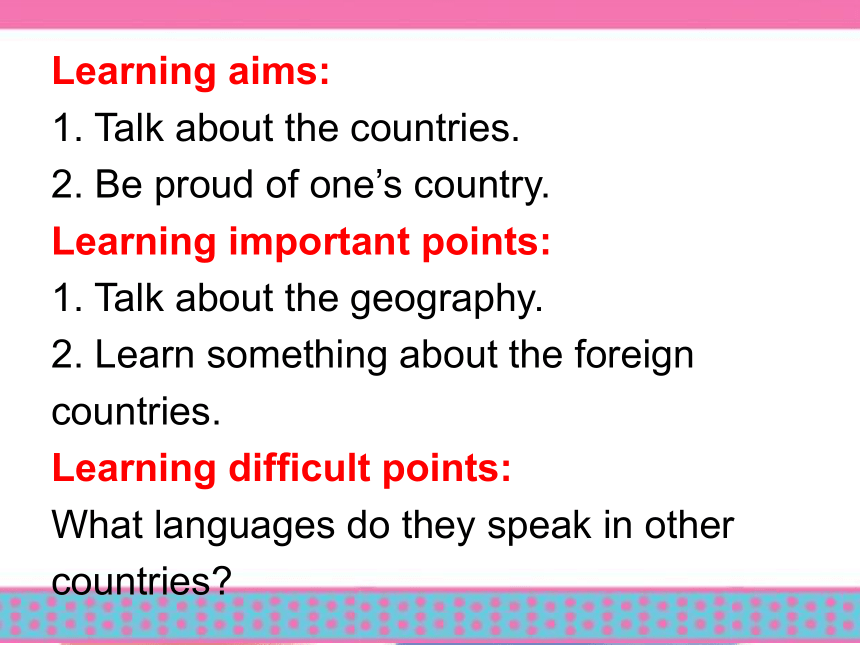
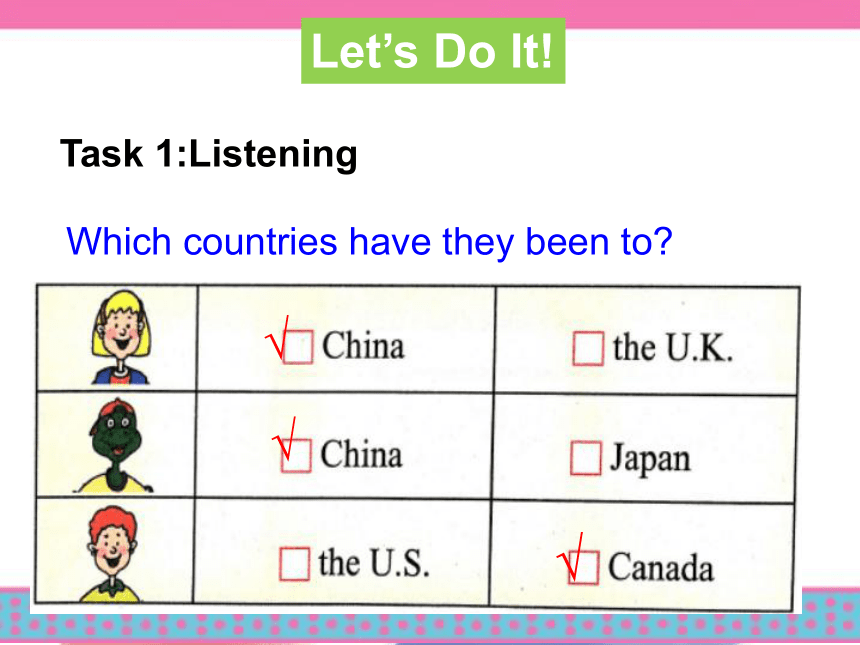
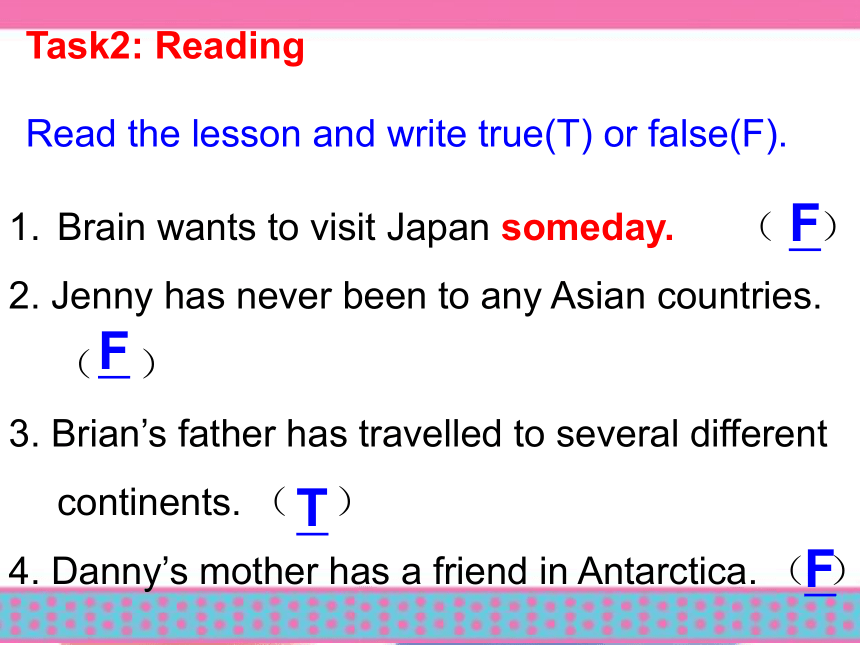
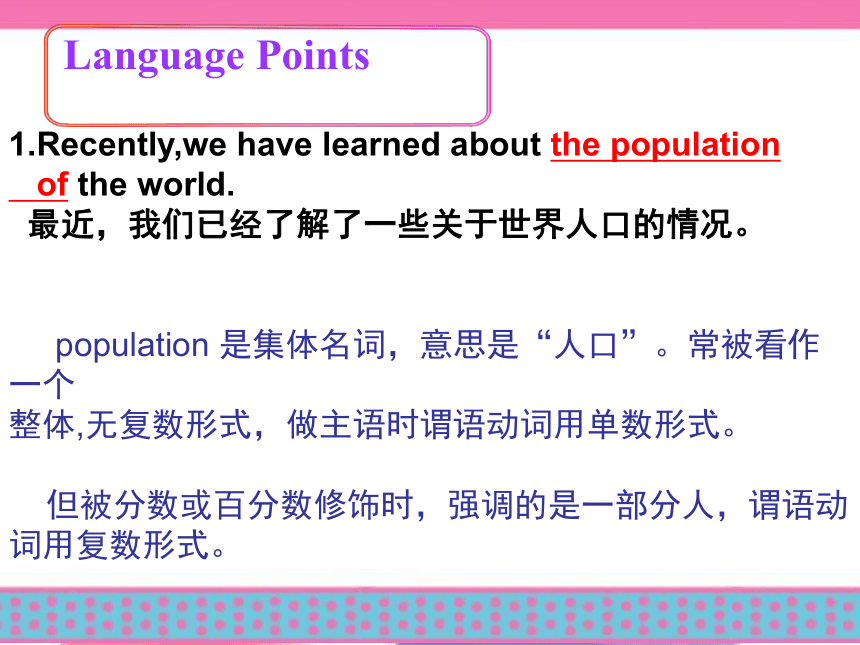
文档简介
(共26张PPT)
Welcome to our class!
Welcome to our class!
Welcome to our class!
travelling
Know Our World
Free talk
What’s your favourite subject
What is geography
Do you like geography
Why or why not
What places would you like to visit Why
New words:
population (n) 人口
abroad (adv) 到国外,在国外
Japan (n) 日本
Japanese (n)日语,日本人
(adj) 日语的,日本人的
Antarctica (n) 南极洲
island (n) 岛,岛屿
Pacific (n /adj) 太平洋(的)
Learning aims:
1. Talk about the countries.
2. Be proud of one’s country.
Learning important points:
1. Talk about the geography.
2. Learn something about the foreign countries.
Learning difficult points:
What languages do they speak in other countries
Let’s Do It!
Which countries have they been to
Task 1:Listening
√
√
√
Read the lesson and write true(T) or false(F).
Brain wants to visit Japan someday. ( )
2. Jenny has never been to any Asian countries. ( )
3. Brian’s father has travelled to several different continents. ( )
4. Danny’s mother has a friend in Antarctica. ( )
Task2: Reading
F
F
T
F
Language Points
1.Recently,we have learned about the population
of the world.
最近,我们已经了解了一些关于世界人口的情况。
population 是集体名词,意思是“人口”。常被看作一个
整体,无复数形式,做主语时谓语动词用单数形式。
但被分数或百分数修饰时,强调的是一部分人,谓语动词用复数形式。
指人口“多”或“少”时,一般用large 或small来表示。不用many 或few.
例如:China is a country with a population.
中国是一个人口众多的国家。
例如:1)The population of the world getting
larger and larger. 世界人口变得越来越多。
2)About seventy percent of the population in China —— farmers.
中国百分之七十的人口是农民。
is
are
large
表示某国,某城市有多少人口时,一般说has a population of或The population of…is…. 提问“有多少人口” 用what或How
large
例如: What’s the population of Binxian
=How large is the population of Binxian
回答可用:It’s over 300,000.
=The population of Binxian is over 300,000 .
=Binxian has a population of more than 300,000.
2. Have you ever been abroad, Danny
你曾经出过国吗,丹尼?
be abroad意为“在国外”,
go abroad意为“出国”。
abroad 是表示地点的副词,其前一般不加介 词to。
eg: My father is abroad now.
我爸爸现在在国外。
My aunt has already gone abroad.
我的姑姑已经出国了。
3. Have you been to any other countries in Asia 你曾经去过亚洲其他的国家吗?
1)have/has been to 意思是“去过某地,已经回来” 。
eg: I have been to Beijing many times.
Jim has been to France.
have/has gone to 意思是“去了某地,还未回来”
eg: --- Where is your brother
--- He has gone to the library.
have/has been in 意思是“一直在某地,未离开”。
eg: I have been in Chengguan Middle School for twenty years.
2) “any other +单数名词”结构常用于
比较级的肯定句中表示最高级的含义
eg:
He is taller than any other boy in our class.
=He is the tallest boy in our class.
“any other +复数名词”结构常用于否定句和疑问句中。
eg:
Do you have any other colours
Brian wouldn’t like to visit any other countries in Africa.
4. I speak a little Chinese.
我讲一点儿汉语。
(1) a little修饰不可数名词, 意为“有一点儿;有一些”,表示肯定的含义。如:
eg: Don’t worry. There is a little time left.
不要担心。还有点儿时间。
(2) a little 可修饰形容词、副词及比较级, 相当于a bit。 eg: I felt a little tired after walking so far.
走了这么远之后,我觉得有点儿累。
Mary is a little shorter than Jenny.
5.He has been to every continent except Antarctica. 他去过除南极洲外的每个洲。
(1) “except” 意思是“除……之外”,是排除关系,即从整体减去一部分。它不能用于句首。
eg: We all succeed except Tom.
(2) “except for”意思是“除……之外”,是对主要部分的肯定和对局部的否定.
eg: Your composition is wonderful except for a few spelling mistakes.
(3) “besides”=aside from.意思是“除……之外还有……”,是外加之意。
eg: They went to the West Lake besides/aside from me.
6.I can’t wait to go. 我迫不及待地想去。
can’t wait to do sth
意为“迫不及待地想去做某事”
= can’t wait for sth
eg: I can’t wait to visit the famous writer.
We can’t wait for Christmas to come.
I. 根据汉语或首字母提示,完成单词。
1. Allan will go ______ (到国外) next month.
2. I'd like to visit some places we have learnt about in _________ (地理) lessons.
3. Students from all over the ______ (世界) come to study at Oxford.
4. Tokyo is the capital city of J_________.
5. He left his _________ (岛屿) and went to work in Guangzhou.
II. Fill in the blanks with the words in this lesson.
1). A: Which country has the largest p__________
B: China, of course.
2). A: Is Taiwan an i_____
B: Yes. It is in the Pacific.
3). A: I like all fruits e______ bananas.
B: Really I don’t like them, either.
4). Mr Wang has gone a_____, so I won’t see him this week.
5). The people in Japan speak J________.
island ['a l nd]
opulation
sland
xcept
broad
apanese
III. 句型转换,每空一词。
1. The population of the city is 2,000,000. (对划线部分提问)
_________ _______ the population of the city
2. There are ten people in her team. (对划线部分提问)
_________ _________ _________ are there in her team
What is
How many people
3. China is the largest country in Asia.
(改为同义句)
China is _______ than _______ _______ country in Asia.
4. I have been to Hong Kong.
(改为一般疑问句)
_________ _________ been to Hong Kong
5. My mother hopes that she can visit some countries in Africa. (改为简单句)
My mother _____ _____ visit some countries in Africa.
larger any other
Have you
hopes to
拓展提升:用所给词汇完成短文
learn about one day except have been to have gone to
I love learning Geography. In geography class, we can __________ people and different cultures in different parts of the world. This week, my
geography teacher is organizing us to get ready for our project--- spring outing. It‘s a good chance to step close to the nature. We ____________ many beautiful scenic spottings _______ the seaside. Because it’s a little far from here. My aunt _________ Hawaii this week. I hope ________ I could go there too. It's my dream.
learn about
have been to
one day
except
has gone to
课后思考
What country or place are you interested in
Where will you work and live in the future
Homework
1. Read and listen the text again.
2. Finish off your exercise book.
3. Write about some countries that you like to
visit.
Nature is conquered by obeying her.
顺应自然方能征服自然。
Welcome to our class!
Welcome to our class!
Welcome to our class!
travelling
Know Our World
Free talk
What’s your favourite subject
What is geography
Do you like geography
Why or why not
What places would you like to visit Why
New words:
population (n) 人口
abroad (adv) 到国外,在国外
Japan (n) 日本
Japanese (n)日语,日本人
(adj) 日语的,日本人的
Antarctica (n) 南极洲
island (n) 岛,岛屿
Pacific (n /adj) 太平洋(的)
Learning aims:
1. Talk about the countries.
2. Be proud of one’s country.
Learning important points:
1. Talk about the geography.
2. Learn something about the foreign countries.
Learning difficult points:
What languages do they speak in other countries
Let’s Do It!
Which countries have they been to
Task 1:Listening
√
√
√
Read the lesson and write true(T) or false(F).
Brain wants to visit Japan someday. ( )
2. Jenny has never been to any Asian countries. ( )
3. Brian’s father has travelled to several different continents. ( )
4. Danny’s mother has a friend in Antarctica. ( )
Task2: Reading
F
F
T
F
Language Points
1.Recently,we have learned about the population
of the world.
最近,我们已经了解了一些关于世界人口的情况。
population 是集体名词,意思是“人口”。常被看作一个
整体,无复数形式,做主语时谓语动词用单数形式。
但被分数或百分数修饰时,强调的是一部分人,谓语动词用复数形式。
指人口“多”或“少”时,一般用large 或small来表示。不用many 或few.
例如:China is a country with a population.
中国是一个人口众多的国家。
例如:1)The population of the world getting
larger and larger. 世界人口变得越来越多。
2)About seventy percent of the population in China —— farmers.
中国百分之七十的人口是农民。
is
are
large
表示某国,某城市有多少人口时,一般说has a population of或The population of…is…. 提问“有多少人口” 用what或How
large
例如: What’s the population of Binxian
=How large is the population of Binxian
回答可用:It’s over 300,000.
=The population of Binxian is over 300,000 .
=Binxian has a population of more than 300,000.
2. Have you ever been abroad, Danny
你曾经出过国吗,丹尼?
be abroad意为“在国外”,
go abroad意为“出国”。
abroad 是表示地点的副词,其前一般不加介 词to。
eg: My father is abroad now.
我爸爸现在在国外。
My aunt has already gone abroad.
我的姑姑已经出国了。
3. Have you been to any other countries in Asia 你曾经去过亚洲其他的国家吗?
1)have/has been to 意思是“去过某地,已经回来” 。
eg: I have been to Beijing many times.
Jim has been to France.
have/has gone to 意思是“去了某地,还未回来”
eg: --- Where is your brother
--- He has gone to the library.
have/has been in 意思是“一直在某地,未离开”。
eg: I have been in Chengguan Middle School for twenty years.
2) “any other +单数名词”结构常用于
比较级的肯定句中表示最高级的含义
eg:
He is taller than any other boy in our class.
=He is the tallest boy in our class.
“any other +复数名词”结构常用于否定句和疑问句中。
eg:
Do you have any other colours
Brian wouldn’t like to visit any other countries in Africa.
4. I speak a little Chinese.
我讲一点儿汉语。
(1) a little修饰不可数名词, 意为“有一点儿;有一些”,表示肯定的含义。如:
eg: Don’t worry. There is a little time left.
不要担心。还有点儿时间。
(2) a little 可修饰形容词、副词及比较级, 相当于a bit。 eg: I felt a little tired after walking so far.
走了这么远之后,我觉得有点儿累。
Mary is a little shorter than Jenny.
5.He has been to every continent except Antarctica. 他去过除南极洲外的每个洲。
(1) “except” 意思是“除……之外”,是排除关系,即从整体减去一部分。它不能用于句首。
eg: We all succeed except Tom.
(2) “except for”意思是“除……之外”,是对主要部分的肯定和对局部的否定.
eg: Your composition is wonderful except for a few spelling mistakes.
(3) “besides”=aside from.意思是“除……之外还有……”,是外加之意。
eg: They went to the West Lake besides/aside from me.
6.I can’t wait to go. 我迫不及待地想去。
can’t wait to do sth
意为“迫不及待地想去做某事”
= can’t wait for sth
eg: I can’t wait to visit the famous writer.
We can’t wait for Christmas to come.
I. 根据汉语或首字母提示,完成单词。
1. Allan will go ______ (到国外) next month.
2. I'd like to visit some places we have learnt about in _________ (地理) lessons.
3. Students from all over the ______ (世界) come to study at Oxford.
4. Tokyo is the capital city of J_________.
5. He left his _________ (岛屿) and went to work in Guangzhou.
II. Fill in the blanks with the words in this lesson.
1). A: Which country has the largest p__________
B: China, of course.
2). A: Is Taiwan an i_____
B: Yes. It is in the Pacific.
3). A: I like all fruits e______ bananas.
B: Really I don’t like them, either.
4). Mr Wang has gone a_____, so I won’t see him this week.
5). The people in Japan speak J________.
island ['a l nd]
opulation
sland
xcept
broad
apanese
III. 句型转换,每空一词。
1. The population of the city is 2,000,000. (对划线部分提问)
_________ _______ the population of the city
2. There are ten people in her team. (对划线部分提问)
_________ _________ _________ are there in her team
What is
How many people
3. China is the largest country in Asia.
(改为同义句)
China is _______ than _______ _______ country in Asia.
4. I have been to Hong Kong.
(改为一般疑问句)
_________ _________ been to Hong Kong
5. My mother hopes that she can visit some countries in Africa. (改为简单句)
My mother _____ _____ visit some countries in Africa.
larger any other
Have you
hopes to
拓展提升:用所给词汇完成短文
learn about one day except have been to have gone to
I love learning Geography. In geography class, we can __________ people and different cultures in different parts of the world. This week, my
geography teacher is organizing us to get ready for our project--- spring outing. It‘s a good chance to step close to the nature. We ____________ many beautiful scenic spottings _______ the seaside. Because it’s a little far from here. My aunt _________ Hawaii this week. I hope ________ I could go there too. It's my dream.
learn about
have been to
one day
except
has gone to
课后思考
What country or place are you interested in
Where will you work and live in the future
Homework
1. Read and listen the text again.
2. Finish off your exercise book.
3. Write about some countries that you like to
visit.
Nature is conquered by obeying her.
顺应自然方能征服自然。
同课章节目录
- Unit 1 Spring Is Coming
- Lesson 1 How's the weather?
- Lesson 2 It's Getting Warmer!
- Lesson 3 Sun Is Rising
- Lesson 4 The Spring City
- Lesson 5 Babysitting on a Spring Day
- Lesson 6 Stories about Spring
- Unit 2 Plant a Plant
- Lesson 7 Planting Trees
- Lesson 8 Why Are Plants Important?
- Lesson 9 Gardening with Mary
- Lesson 10 Make Your Garden Grow!
- Lesson 11 Amazing Plants
- Lesson 12 Danny's Plant
- Unit 3 Animals Are Our Friends
- Lesson 13 Danny's Big Scare
- Lesson 14 Amazing Animals
- Lesson 15 The Zoo Is Open
- Lesson 16 The Pear Escaped
- Lesson 17 Save the Tigers
- Lesson 18 Friendship Between Animals
- Unit 4 The Internet Connects Us
- Lesson 19 How Do You Use the Internet?
- Lesson 20 A Computer Helps!
- Lesson 21 Books or Computers?
- Lesson 22 Travel on the Internet
- Lesson 23 The Internet--Good or Bad?
- Lesson 24 An E-mail to Grandpa
- Unit 5 Buying and Selling
- Lesson 25 Raising Money
- Lesson 26 Cookies, Please!
- Lesson 27 Business English
- Lesson 28 Ms. Liu's Great Idea
- Lesson 29 How to Push a Product
- Lesson 30 A Cookie Sale
- Unit 6 Be a Champion!
- Lesson 31 Don't Fall, Danny
- Lesson 32 My Favourite Record
- Lesson 33 2800 Years of Sports
- Lesson 34 Modern Olympics
- Lesson 35 The Dream Team
- Lesson 36 Classroom Olympics
- Unit 7 Know Our World
- Lesson 37 Let's Learn Geography!
- Lesson 38 The World Is a Big Place
- Lesson 39 Ring Up or Call?
- Lesson 40 Body Language
- Lesson 41 A Class of the World
- Lesson 42 North America
- Unit 8 Save Our World
- Lesson 43 Let's Clean Up!
- Lesson 44 Environment Clubs
- Lesson 45 Let's Sort Garbage!
- Lesson 46 Protect Our Environment
- Lesson 47 Connected to Nature
- Lesson 48 Garbage Is Interesting!
